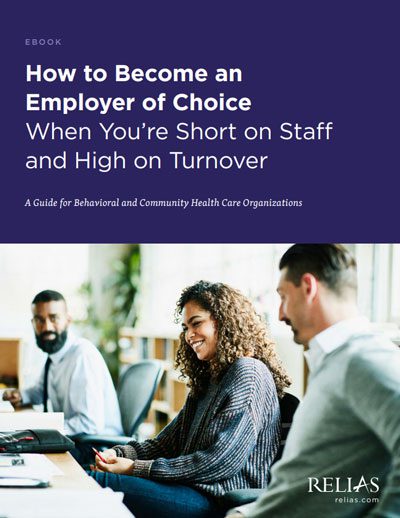From counseling individuals with mental health disorders to helping vulnerable children and families access critical resources, behavioral health professionals perform a wide range of important work. But while there’s no question that these professionals are an irreplaceable part of every community, far too many go without them due to the mental health workforce shortage.
As demand for behavioral health providers increases across the U.S., shortages of behavioral health providers have left many individuals without access to the resources they need to lead safe, healthy lives. To help behavioral health administrators recruit and retain employees and meet the needs of the communities they serve, comprehensive strategies must be put into play.
The workforce shortage in behavioral and mental health
The U.S. is facing significant shortages within the behavioral and mental health workforce — a crisis that is escalating as demand increases and supply decreases. These problems are particularly evident in rural counties, more than half of which do not have a single psychiatrist available. In fact, recent research has shown that in locations designated as Health Care Professional Shortage Areas (HPSAs), only 28% of mental healthcare needs are being met. It would take 6,559 providers to meet this large demand.
Predictions made before the COVID-19 pandemic emphasized a shortfall of tens of thousands of behavioral health professionals. This new evidence suggest that the pandemic will continue to have long-term effects on staffing, leaving emotional and psychological trauma in its wake.
The Substance Abuse and Mental Health Services Administration (SAMHSA) predicts that, by 2025, the U.S. will have shortages of:
- 78,050 school counselors
- 57,490 psychologists
- 48,540 social workers
- 26,930 mental health counselors
- 15,400 psychiatrists
- 10,470 marriage and family therapists
These shortages will be facilitated by increasing demand for the services provided by these professionals. According to the National Council for Mental Welbeing, demand for behavioral health services will increase by the following percentages by 2030:
- Addiction counselors: 21-30%
- Mental health counselors: 18-20%
- Psychiatric nurse practitioners and psychiatric physician assistants: 17%
- Social workers: 15%
- Psychiatric technicians and psychiatric aides: 13-16%
- Marriage and family therapists: 14%
- Psychologists: 7%
- Psychiatrists: 6%
At a time when nearly one in five Americans lives with a mental health condition, and more people than ever are interested in seeking behavioral health support, this lack of access to qualified behavioral health professionals stands to jeopardize the wellbeing of individuals and communities across the country.
Why is there a behavioral and mental health workforce shortage?
A variety of factors have contributed to the behavioral and mental healthcare workforce shortage, making mental health provider recruitment and retention particularly challenging.
One reason for the shortage is increasing awareness and understanding of behavioral healthcare services. According to a report published by the Centers for Disease Control and Prevention, the percent of Americans who attributed major depression to neurobiological causes increased by 13% between 1996 and 2006. Similarly, a larger percentage of people endorsed the benefits of treatment for people with major depression in 2006 (91%) than in 1996 (78%).
Other causes of the shortage are less positive. Behavioral health professionals are aging out of the profession faster than they can be replaced, leading to a retirement drain on the industry. In 2019, more than 61% of practicing psychiatrists were over the age of 55 — a percentage higher than many other healthcare specialties.
Behavioral health providers are also frequently paid less than other professionals in healthcare and beyond. This disparity is part of a larger problem in which, despite the progress made, society does not yet fully value behavioral health and stigma surrounding mental health disorders persists. In addition, organizations often face financial barriers (many of which, like poor funding, are outside of their control) that prevent them from offering competitive salaries or benefit packages that could entice and retain employees.
The lack of recognition and low pay are sacrifices that individuals must be willing to make before entering the behavioral health workforce. These sacrifices are significant and often deter new employees from entering the field.
Why is it important to retain behavioral health providers?
Despite the efforts of many educational institutions, there simply aren’t enough individuals entering the behavioral healthcare field to meet demand. When behavioral health administrators attain high-quality staff, they must strive to hold on to them as best as possible or risk finding themselves struggling to hire new, qualified staff from a very limited candidate pool.
Retaining staff and reducing turnover can also help healthcare organizations save money. Turnover can cost organizations anywhere from one-half to two times an employee’s salary to replace. It also impacts the quality of care they provide, as new hires take time to adjust to the organization’s specific practices and the nuances of the community they serve.
How to retain behavioral health providers
Retaining behavioral health providers is easier said than done — especially when many facilities lack the resources to offer significant monetary incentives. Fortunately, there are several steps organizations can take to increase the chances that their providers will remain invested in their organization.

How to be an Employer of Choice When You're Short on Staff and High on Turnover
Are highly qualified clinicians vying to work at your organization? Do your most talented staff members want to stay at your behavioral or community health care center? Answering “yes” to these questions is what it means to be an “employer of choice” — an achievement status that has become essential for healthcare employers given the staff shortage crisis and soaring turnover rates.
Download the white paper →





